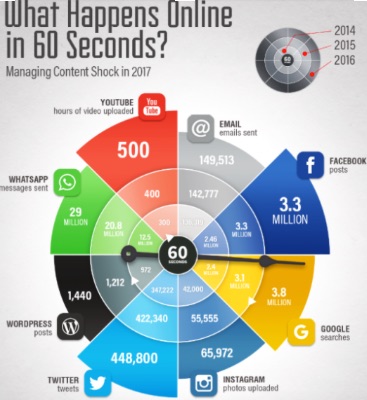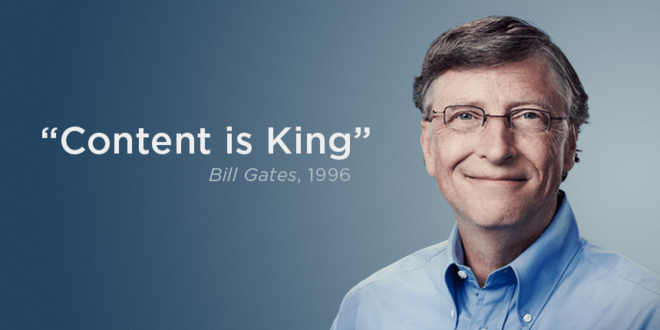 By Tina Ornstein, IOD Editor
By Tina Ornstein, IOD Editor
You have to hand it to him—Bill Gates once again positioned himself as a visionary when he postulated in 1996, when the internet was still in its infancy, that content would be king. What kind of content? Here’s what he wrote:
If people are to be expected to put up with turning on a computer to read a screen, they must be rewarded with deep and extremely up-to-date information that they can explore at will. They need to have audio, and possibly video. They need an opportunity for personal involvement that goes far beyond that offered through the letters-to-the-editor pages of print magazines.
Bill Gates was referring primarily to content assets generated and owned by “classic” publishers, such as newspapers, entertainment companies, and so on. However, even he did not foresee the tsunami of free user- and enterprise-generated content that dominates the internet today: social media posts, blogs, infographics, podcasts, videos, and more. He also did not foresee the “army” of content creators that would be necessary to generate content at scale—an army of the type I am proud to be a part of through my work with IOD Cloud Research Technologies.
The B2B Content Marketing Revolution

The relative ease of publishing self-generated content on the internet spawned a revolution in marketing. Brands and enterprises soon came to realize that their online target audiences do not want to be “interrupted” by advertising content. Instead, they want to be “engaged” by content that answers questions, speaks to them directly, and invites dialogue. B2C and B2B content marketing was born and, in 2017, we are already in a state of what some are calling “content shock.” The infographic to the right clearly shows the dramatic growth and overwhelming scope of user-generated content that goes online every 60 seconds.
Content-based marketing has become essential to meeting customer expectations. Recent studies have shown that 68% of consumers feel more positive about a brand after engaging with brand-generated content, and 73% of enterprise customers prefer to receive information from articles vs. ads.
It’s not surprising, therefore, that a 2016 report by the Content Marketing Institute shows us that:
- 88% of organizations use content marketing
- On average 28% of marketing budgets (not including staff) is spent on content marketing
- 70% of B2B marketers expected to create more content in 2017 than in 2016
From our experience at IOD, we can confidently say that organizations in our areas of specialty (cloud computing, DevOps, cybersecurity, Enterprise IT, mobile, and blockchain) must (and do) invest in high-quality content in order to remain competitive.
A Few Words on Content and SEO
It used to be that a judicious use of keywords was enough to get a high SEO ranking. Since February 2011, however, Google has introduced algorithms into its search engine that evaluate the extent to which target content effectively answers searcher’s queries (Panda) and the quality of the links in a content item (Penguin); and how to better match conversational search queries with content (Hummingbird).
The bottom line is that an enterprise’s content has to be tightly integrated with its SEO strategy. The more your well-researched, informative, honest content is refreshed, focused around relevant keywords, and effectively linked to other content, the better chance it has of getting a high SEO ranking and catching the attention of your target audience. And apparently size counts as well: we learn from Brian Dean at Backlinko that the average word count of a Google first page result is 1,890.
The 5 Best Practices of Winning B2B Content Marketers
There are a number of best practices that keep winning B2B content marketers ahead of the curve:
- Having a documented content management strategy: The value of a clear, easily communicated corporate strategy for key business activities is well-established. The top third (37%) of B2B marketers have taken the trouble to document and communicate their content management strategy.
- Facilitating good team communications: Of the 44% of B2B content marketing teams that meet daily or weekly, 70% consider these meetings valuable. Among those that meet less frequently (biweekly or monthly), only 49% find that the meetings are valuable in achieving the team’s content marketing objectives. And if your team includes outsourced content creation partners like IOD, don’t forget to keep them in the loop as well.
- Consistent, engaging, diverse, customer-centric content: High-quality content establishes the organization’s thought leadership, wins and maintains customer loyalty and trust, and improves SEO rankings.
- Budget allocation for content creation and distribution: Winning B2B marketers know that good-quality content, whether in-house or outsourced, comes with a substantial price tag. The budget must be sufficient to facilitate the creation and distribution of content at scale.
- Know how to measure effectiveness: In order to justify and protect content management budgets, winning content marketers carefully track ROI metrics, such as the number and quality of sales leads generated.
A Final Note
Enterprises today know that they have no choice but to make content king, and leverage it through winning content management and SEO strategies. In order to create good quality content to scale, it is often necessary to look beyond in-house teams, and make use of outsourced resources as well.
Day in and day out, we at IOD live and breathe content marketing. We are a trusted content creation partner for leading cloud and software companies in Israel and North America. I’m proud to be part of a team of writers, editors, and subject matter experts that earns trust by working closely with each other and with the customer to deliver the kind of high-quality content that drives successful B2B content marketing.







